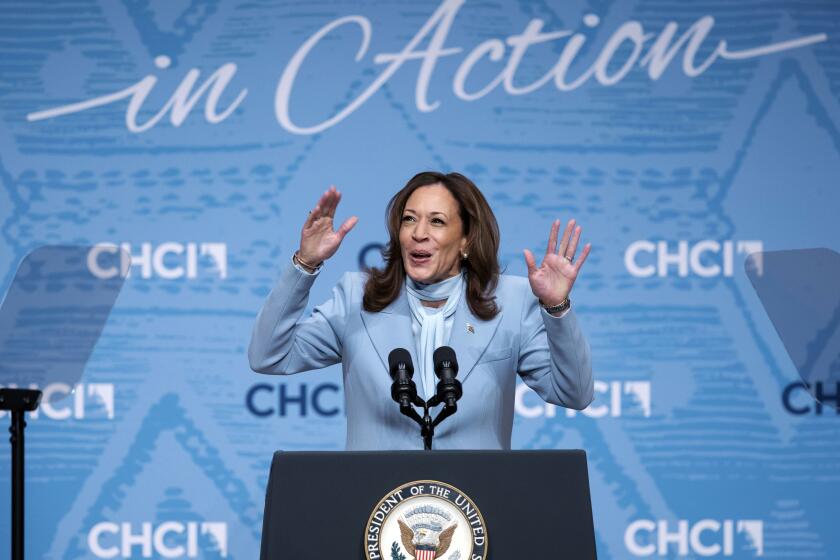Zaire’s Self-Declared Opposition
After years of spearheading nonviolent opposition to a brutal dictatorship, Etienne Tshisekedi announced Friday that he has a new mission: defiance of self-described democrat and self-declared President Laurent Kabila.
Hours after Kabila excluded Tshisekedi from the new interim Cabinet, the longtime opposition leader told a news conference that the new government is “another dictatorship” that he does not recognize.
“That’s why I call on the people to resist with all their strength and energy,” Tshisekedi said.
Kabila, he asserted, is not president: “He is just a candidate for president.”
The burning question in markets, embassies and the “street parliament,” as Kinshasans call the crowds who fiercely debate the day’s headlines at newspaper stands, is whether Tshisekedi can seriously endanger the regime Kabila has named to replace that of ousted despot Mobutu Sese Seko.
Even as Tshisekedi spoke, several hundred of his supporters angrily marched through city streets and past the U.S. Embassy, waving banners and shouting that Kabila was an “assassin” who deserved to be hanged.
The raucous mob attacked at least three bystanders, ripping a pro-Kabila shirt off one man and beating another with a chair.
Protesters warned that they will battle Kabila’s rule with the same disruptive strikes that regularly crippled the capital under Mobutu.
“The struggle still goes on,” shouted Robert Katenda, 28, who is jobless. “We will fight!”
But many Tshisekedi supporters say he erred by refusing to join the new government unless he was appointed prime minister and made the most powerful figure in government, a demand Kabila refused. Tshisekedi repeatedly served as prime minister under Mobutu.
“Tshisekedi has shown he’s selfish, an egotist,” said Mamputu Tshiento, 46, a tall, toothless woman in the swarming “street parliament” in the Lemba neighborhood. “He should have accepted any position if he really wanted to help the country now.”
*
A senior Western diplomat agreed, calling Tshisekedi “blockheaded” for stubbornly refusing to consider other Cabinet portfolios. The envoy dismissed his threats as bombast and bluster.
“It doesn’t matter what Tshisekedi says,” the envoy said with a shrug.
Kabila’s advisors also appeared unalarmed. “I don’t think there will be any clash,” said Bizima Karaha, the new foreign minister.
But, Karaha warned: “We are not going to play games with this victory. We are not going to take any nonsense from anybody for any reason just to make people happy.”
Tshisekedi has long frustrated those who seek to work with him.
Critics say his pettiness and intransigence--plus the fact that he sometimes stays in bed for days at a time--fractured and undermined the anti-Mobutu movement here.
But Tshisekedi may successfully tap rising public resentment and fear here now of the Rwandan, Ugandan, Angolan and other foreign African troops in Kabila’s guerrilla army, which captured the capital last weekend.
“We don’t want people from Rwanda here,” one protester said.
“Kabila has sold the country to the Rwandese!” shouted another.
Kabila’s Alliance of Democratic Forces for the Liberation of Congo-Zaire has long denied and tried to conceal troops and other support sent by sympathetic countries during the seven-month civil war.
*
But few doubts remain now that the guerrillas have finally emerged from the jungle.
Many, for example, speak only Rwanda’s Kinyarwanda, Uganda’s English or Angola’s Portuguese. Often unsmiling and unable to talk to locals, the liberators increasingly resemble an occupation army.
“A fracture is looming, clouds are gathering on the horizon,” warned a Friday editorial in Kinshasa’s Le Phare newspaper.
At his news conference, Tshisekedi called Kabila a hostage of his advisors and politely asked “brother African countries to call back their troops . . . so Zairians can resolve their problems.”
That was a double jab at Kabila, who has renamed the nation Democratic Republic of Congo, as it was called after independence from Belgium in 1960. Mobutu changed the name in 1971.
Other concerns are being voiced about Kabila as well. He has suspended the democratic transitional constitution that leaders such as Tshisekedi laboriously negotiated with Mobutu before his fall.
In addition, Kabila’s aides said only individuals, not party representatives, are allowed to join the new government.
So far, Kabila has said nothing in public.
He has been sequestered with his aides since his arrival after dark Tuesday. Nervous residents constantly ask reporters when their new ruler will appear to address them. No one seems to know.
However, there was finally news Friday about the whereabouts of Mobutu.
A week after he fled Kinshasa, the cancer-stricken strongman flew into Rabat, the capital of Morocco, from the West African nation of Togo.
He was accompanied by his wife and 56 family members and followers, according to news agency accounts. Diplomats expect him to seek permanent exile on the French Riviera, where he has a seaside villa.
More to Read
Sign up for Essential California
The most important California stories and recommendations in your inbox every morning.
You may occasionally receive promotional content from the Los Angeles Times.











